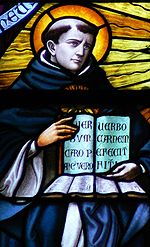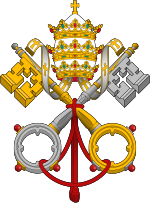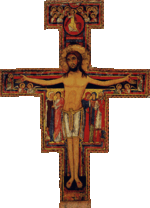- Wilhelm Emmanuel Freiherr von Ketteler
-
 Bishop von Ketteler
Bishop von Ketteler
Wilhelm Emmanuel Freiherr[1] von Ketteler (25 December 1811 – 13 July 1877) was a German theologian and politician who served as Bishop of Mainz. His social teachings became influential during the papacy of Leo XIII and his encyclical Rerum Novarum.
Contents
Early life and ordination
Ketteler was born in Münster in Westphalia. 1828 he finished the Matura in Brig, Switzerland far away of his home. He studied theology at Göttingen, Berlin, Heidelberg and Munich, and was ordained priest in 1844. He resolved to consecrate his life to maintaining the cause of the freedom of the Church from the control of the State. This brought him into collision with the civil power, an attitude which he maintained throughout a stormy and eventful life.
Scholar and politician
Ketteler was rather a man of action than a scholar, and he first distinguished himself as the deputy for District of Tecklenburg and Warendorf at the Frankfurt National Assembly,[2] a position to which he was elected in 1848, and in which he soon became noted for his decision, foresight, energy and eloquence.
Bishop
In 1850 he was made bishop of Mainz, by order of the Vatican, in preference to the celebrated Professor Leopold Schmidt, of Gießen, whose Liberal sentiments were not agreeable to the Papal party. When elected, Ketteler refused to allow the students of theology in his diocese to attend lectures at Giessen, and ultimately founded an opposition seminary in the diocese of Mainz itself.
Educator
He also founded orders of School Brothers and School Sisters, to work in the various educational agencies he had called into existence, and he labored to institute orphanages and rescue homes. In 1851, he founded the congregation of the Sisters of Divine Providence, with Stephanie Amelia Starkenfels de la Roche At the death of St. Vincent de Paul, he spent two hours telling the story of his life and his miracles.
Death and legacy
He died at Burghausen, Upper Bavaria in 1877.
In Mainz, "Workers' Day" is celebrated in honor of the Bishop. The fuchsia cultivar "Baron de Ketteler" is named after him. Ketteler's nephew, Klemens von Ketteler, was Germany's envoy in China and was murdered during the Boxer Rebellion.
He is cited in Pope Benedict's encyclical Deus Caritas Est for his role in the Catholic social tradition.
Views
Protestantism
In 1861, Ketteler published a book on reconciliation between Catholics and Protestants in Germany, Freiheit, Autorität, und Kirche; in it, he proposed the founding of a prayer society "for the Reunion of Christendom".[3] Ketteler was friends with Julie von Massow, a Lutheran woman from Prussian nobility, who indeed founded such a prayer society.[4]
Church rights
In 1858, Ketteler threw down the gauntlet against the State in his pamphlet on the rights of the Roman Catholic Church in Germany. In 1863 he adopted Lassalle's socialist views, and published his Die Arbeitfrage und das Christenthum.
Papal infallibility
When the question of papal infallibility arose, he opposed the promulgation of the dogma on the ground that such promulgation was inopportune. But after the dogma was defined, he submitted to the decrees (in August 1870).
Kulturkampf
He was the warmest opponent of the State in the Kulturkampf provoked by Prince Otto von Bismarck after the publication of the Vatican decrees, and was largely instrumental in compelling that statesman to retract the pledge he had rashly given, never to "go to Canossa."
Battle of Sedan
To such an extent did Bishop von Ketteler carry his opposition, that in 1874 he forbade his clergy to take part in celebrating the anniversary of the Battle of Sedan, and declared the Rhine to be a "Catholic river."
Notes
- ^ Regarding personal names: Freiherr is a title, translated as Baron, not a first or middle name. The female forms are Freifrau and Freiin.
- ^
 "Wilhelm Emmanuel, Baron von Ketteler". Catholic Encyclopedia. New York: Robert Appleton Company. 1913.
"Wilhelm Emmanuel, Baron von Ketteler". Catholic Encyclopedia. New York: Robert Appleton Company. 1913. - ^ Unitas, Volume 15. Society of the Atonement. 1963. p. 90. http://books.google.com/books?id=k9MTAAAAIAAJ&q=%22Julie+von+Massow%22&dq=%22Julie+von+Massow%22&hl=en&ei=yw5LTI-lGIH98Aa08v0y&sa=X&oi=book_result&ct=result&resnum=6&ved=0CDsQ6AEwBQ.
- ^ Fleischer, Manfred (1969). "Lutheran and Catholic Reunionists in the Age of Bismarck". Church History 38 (1): 43–66.
References
 Chisholm, Hugh, ed (1911). "Ketteler, Wilhelm Emmanuel, Baron von". Encyclopædia Britannica (11th ed.). Cambridge University Press.
Chisholm, Hugh, ed (1911). "Ketteler, Wilhelm Emmanuel, Baron von". Encyclopædia Britannica (11th ed.). Cambridge University Press.
History of the Catholic Church General History of the Catholic Church · History of the Papacy · History of the Roman Curia · Catholic Ecumenical Councils · Timeline of the Catholic Church · History of Christianity · Role of the Catholic Church in Western civilization · Art in Roman Catholicism · Catholic religious order · Christian monasticism · Papal States
Church beginnings Constantine the Great to
Pope Gregory IConstantine the Great and Christianity · Arianism · Basilica of St. John Lateran · First Council of Nicaea · Pope Sylvester I · First Council of Constantinople · Biblical canon · Jerome · Vulgate · First Council of Ephesus · Council of Chalcedon · Benedict of Nursia · Second Council of Constantinople · Pope Gregory I · Gregorian chant
Early Middle Ages Third Council of Constantinople · Saint Boniface · Byzantine Iconoclasm · Second Council of Nicaea · Charlemagne · Pope Leo III · Fourth Council of Constantinople · East–West Schism
High Middle Ages Pope Urban II · Investiture Controversy · Crusades · First Council of the Lateran · Second Council of the Lateran · Third Council of the Lateran · Pope Innocent III · Latin Empire · Francis of Assisi · Fourth Council of the Lateran · Inquisition · First Council of Lyon · Second Council of Lyon · Bernard of Clairvaux · Thomas Aquinas
Late Middle Ages Protestant Reformation/
Counter-ReformationBaroque Period to the
French Revolution19th century Pope Pius VII · Pope Pius IX · Dogma of the Immaculate Conception of the Virgin Mary · Our Lady of La Salette · Our Lady of Lourdes · First Vatican Council · Papal infallibility · Pope Leo XIII · Mary of the Divine Heart · Prayer of Consecration to the Sacred Heart · Rerum Novarum
20th century Pope Pius X · Our Lady of Fátima · Persecutions of the Catholic Church and Pius XII · Pope Pius XII · Pope Pius XII Consecration to the Immaculate Heart of Mary · Dogma of the Assumption of the Virgin Mary · Pope John XXIII · Second Vatican Council · Pope Paul VI · Pope John Paul I · Pope John Paul II
21st century By country or region Brazil · Cuba · France · Germany · Hispano-America · Ireland · Japan · Mexico · Spain · United States · Venezuela
History of Catholic theology Theologians · Teachings · HeresiesGeneral History History of the Catholic Church · Early Christianity · History of the Papacy · Ecumenical Councils · Timeline of the Catholic Church · History of Christianity · History of Christian theology
Church beginnings First Epistle of Clement · Didache · Ignatius of Antioch · Epistle of Barnabas · Justin Martyr · Irenaeus · Tertullian · Origen · Antipope Novatian · CyprianConstantine to
Pope Gregory IEarly Middle Ages Monothelitism · Ecthesis · Iconoclasm · Transubstantiation dispute · Predestination disputes · John Scotus EriugenaHigh Middle Ages Mysticism & Reforms Protestant Reformation and
Counter-ReformationBaroque Period to
French RevolutionJacques-Bénigne Bossuet · Francisco Suárez · François Fénelon · Jansenism · Blaise Pascal · Alphonsus Maria de Liguori · Louis de Montfort · Alfonso Muzzarelli · Louis Thomassin · Jean de La Fontaine19th century John Henry Newman · Gaetano Sanseverino · Giovanni Maria Cornoldi · Clemens Maria Hofbauer · Johann Michael Sailer · Joseph Görres · Wilhelm Emmanuel Freiherr von Ketteler · Giuseppe Pecci · Joseph Hergenröther · Tommaso Maria Zigliara · Thérèse of Lisieux20th-21st century Categories:- 1811 births
- 1877 deaths
- German politicians
- German theologians
- German Roman Catholic bishops
- 19th-century Roman Catholic bishops
- Members of the Frankfurt Parliament
- People from Münster
- People from the Province of Westphalia
- University of Göttingen alumni
- Humboldt University of Berlin alumni
- University of Heidelberg alumni
- Ludwig Maximilian University of Munich alumni
- Members of the First Chamber of the Estates of the Grand Duchy of Hesse
- Members of the Reichstag of the German Empire
Wikimedia Foundation. 2010.


